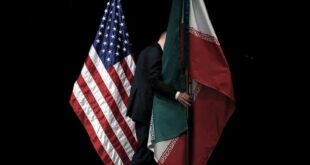 The leaders of Iran and Venezuela cemented an alliance aimed at countering imperialism while the Iranian president said he is pleased with a new ally in Bolivia and declared that together, “no one can defeat us.” President Mahmoud Ahmadinejad traveled on to friendly territories Thursday, first stopping in Bolivia and then visiting Venezuela to meet President Hugo Chavez.
The leaders of Iran and Venezuela cemented an alliance aimed at countering imperialism while the Iranian president said he is pleased with a new ally in Bolivia and declared that together, “no one can defeat us.” President Mahmoud Ahmadinejad traveled on to friendly territories Thursday, first stopping in Bolivia and then visiting Venezuela to meet President Hugo Chavez.
“Together we are surely growing stronger, and in truth no one can defeat us,” the Iranian leader said through an interpreter. Apparently referring to the US, he said, “Imperialism has no other option: Respect the peoples (of the world) or accept defeat.”
Chavez greeted the Iranian leader warmly on a red carpet in front of the presidential palace, where they both stood before microphones and challenged Washington’s bullying policies.
“We will continue resisting to the end in the face of imperialism,” Ahmadinejad said. “And the age of imperialism has ended.”
Chavez embraced the Iranian leader, calling him “one of the greatest anti-imperialist fighters” and “one of the great fighters for true peace.”
In his address to the UN General Assembly this week, Ahmadinejad rebuked “arrogant powers” seeking to curb Iran’s nuclear program.
Chavez also strongly defends Iran’s nuclear research, insisting it is for peaceful energy uses despite US baseless charges it is aimed at making nuclear weapons. The Venezuelan leader also says his country plans to eventually develop a nuclear energy program.
Chavez said he was proud of Ahmadinejad’s courage while under hostile questioning at New York’s Columbia University. “An imperial spokesman tried to disrespect you, calling you a cruel little tyrant. You responded with the greatness of a revolutionary.”
In Bolivia, the Iranian leader pledged investment over the next five years to help the poor Andean nation tap its vast natural gas reserves, extract minerals, generate more electricity and fund agricultural and construction projects.
Bolivian President Evo Morales, who joins Chavez as one of Iran’s key allies, called Ahmadinejad’s visit historic as the two nations established diplomatic relations for the first time.
Morales brushed off concerns about close ties to a country that opposes Bush’s policies, declaring that the “international community can rest assured that Bolivia’s foreign policy is dedicated to peace with equality and social justice.”
Ahmadinejad’s trip underscored his growing ties to Latin American nations, including Nicaragua and Ecuador, even as the US tries to isolate him internationally.
The closer relationship is viewed with alarm by Washington.
Chavez’s government has promised more than $8.8 billion in aid, financing and energy funding to the region this year.
Relations between Iran and Venezuela, meanwhile, have grown very close. Since 2001, they have signed trade agreements worth more than $20 billion in potential investment.
They have teamed up to begin producing cars, tractors and plastic goods, and signed an agreement to help Venezuela build public housing. Iran Air began flights between Tehran and Caracas, with a stopover in Syria, earlier this year.
It was Ahmadinejad’s third visit to Caracas.
Along with Nicaragua and Bolivia, Ecuadorean President Rafael Correa also wants closer ties with Tehran, and Iran’s Press TV reported last month that Iran will for the first time open an embassy in Quito.
 Eurasia Press & News
Eurasia Press & News

